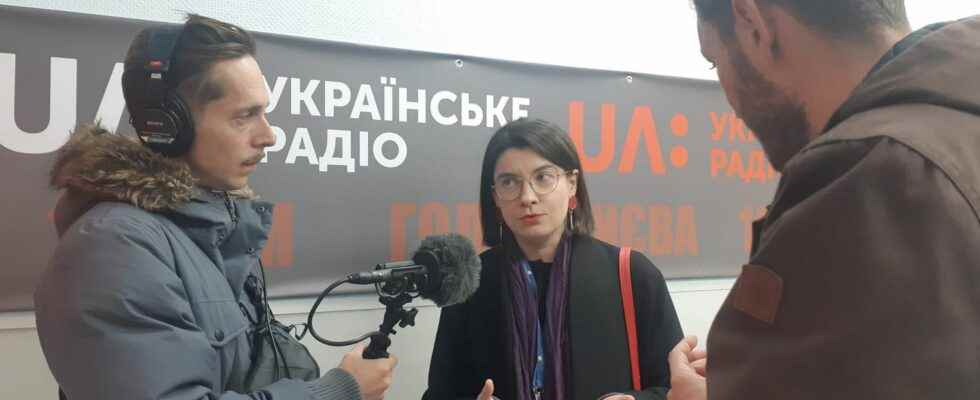A few hundred meters behind Maidan, Independence Square in kyiv, a large building houses the headquarters of Ukrainian public radio, Natsionalna Suspilna Teleradiokompaniia Ukrainy. A radio that obviously adapted to the war situation. We go down some stairs to reach a shelter in the basement, where the information was carried out from February 24, from the first days and the first weeks of the war and the attack of the Russian army. A few stairs, an iron door and it’s Irina Slavinska who welcomes us, producer at Suspilne Kultura, this radio station based in kyiv, in the heart of the capital.
Franceinfo: What does Suspilne Kultura radio represent? What do you do in normal times and since the beginning of the war?
Irina Slavinska: We are a bit like France Culture radio, for example, because Kultura is part of public television broadcasting. All of our teams met on the morning of February 24, 2022 here in the bomb shelter. Me, I took the antenna that morning. One of the first air alerts for all Kievans, it was I who had to announce it. I remember that I was very careful to keep the voice as calm as possible, so as not to stress the audience.
With the impression in those moments, that when the red lights up on the radio, that the microphone is on, that we are talking to people who need to hear this information, to hear a voice, someone who is with them?
For us, this is very important. Already, we have the opportunity to hear the voices of the Ukrainian military. We know very well that many people in the army listen to the radio, and therefore to Ukrainian public radio. But the most touching part of this story of the Ukrainian territories liberated from the cities, Ukrainian towns and villages liberated from the Russians, are the stories of the people who lived through the Russian occupation and who tell us after their liberation, their experience of listening to public radio. The Russians, when they arrive, the first thing they do is turn off the electricity, turn off the Internet, turn off the TV. But the waves of the radio, you know it, they have no borders! It is relatively easy to have the possibility of listening to the radio. And we had this story of a woman in Boutcha who spent March 9 lying on the floor of her apartment: there were shootings, bombardments from the Russian side. She had headphones on and she was listening to a few verses of poetry by Taras Shevchenko, an iconic poet for Ukraine. And she wrote to my colleague that it was something that allowed her to survive this experience. I cried when I heard this story, of course I shared it with the whole team and there were a lot of tears. And also a lot of pride in our work.
Is there excitement at the moment, with the hope of this advance of the Ukrainian army? Do you feel a different mood? The voice on the radio betrays the emotions. Do you feel it in the testimonies too, this hope?
Yes of course. The mood changes and maybe the sound of our voice, the voices we hear, has changed a bit. Maybe it’s already a little lighter than before.
Vladimir Putin has been agitating the nuclear threat more and more often in recent weeks. Is it present today for Ukrainians? Especially for the inhabitants of the capital, kyiv, who can be an obvious target?
Yes of course. It interests a lot of people and I feel that there is also this anxiety linked to these atomic threats, etc. I see that people are interested in fairly practical subjects. What should we see at home, for example, to be prepared for an attack? Is it necessary to have certain medications at home? Is it dangerous to go out? To go home if we were in the street during this possible attack? etc And on the other side, there is of course an interest in political analysis. What does Putin mean by threatening this atomic attack? I feel that our audience is very attentive to these subjects.
It’s been pretty good in Kyiv these days, not too cold. But we are in autumn and winter is coming, with doubts about electricity production in Ukraine, and about living conditions in the coming months. Is this a concern that you perceive?
Yes, and we can also see it in the actions of the municipalities. There are mayors who are already talking about their actions to prepare wood, for example, for heating. But I feel that there are people who have already prepared. There, we are already in October, some have started their preparation in July-August. People are quite ready.
Is there total confidence in the discourse of the Ukrainian authorities? Today, you, as a journalist, what distance do you take with what is also communicated by the authorities and what you must say to your listeners?
When we dialogue with power, of course we use the standard methods of any journalist: we check, we ask the question again, we take up the comments, we ask for some opinions. If there is information on explosions in such and such a city, for example, we always give ourselves enough time to cross-check it with the necessary services. But we also have our own correspondents, our own reporters in these cities.
